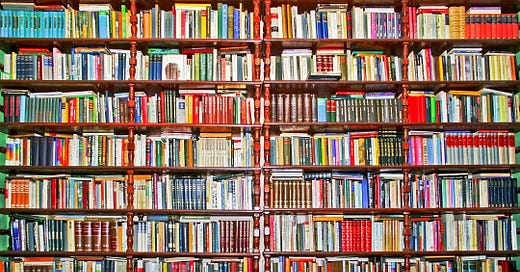Turn Every Page: Your Library and Anti-Library
“Of course anyone who truly loves books buys more of them than he or she can hope to read in one fleeting lifetime. A good book, resting unopened in its slot on a shelf, full of majestic potentiality, is the most comforting sort of intellectual wallpaper.”
A few weeks ago, I maxed out the number of books I was allowed to check out from the Phoenix Public Library. Most people probably don’t even know there’s a limit, much less actually hit the limit. Luckily, I was able to remind the library staff that my card was in fact linked to my wife’s and my kids’, so the borrowing limit quickly increased by a factor of five, which allowed me to check out the books I had stacked in front of me.
I didn’t read all those books. Not yet. Some had to go back unread because others put a hold on them or I had them checked out too long. Others were read and returned, and others remain in piles around the house in a half-read state. I don’t feel bad about having unread books lying around. And I don’t feel bad about checking out books and having to return them before I get around to reading them. There is something useful and powerful about having these repositories of knowledge that we call books lying around waiting for me to open and explore. Even if you buy a book and never read it, having books around seems to increase your curiosity if not your intelligence.
I’m not talking about buying books by the pound or by the foot as an interior decorating plan. I am talking about having intellectual materials around you in case you may need them or in case curiosity piques your interest. There is something useful about having what Nassim Taleb describes in The Black Swan as an “anti-library.” The anti-library is a collection of books that you may never read, but which serves as a tool for research and future knowledge:
Read books are far less valuable than unread ones. The library should contain as much of what you do not know as your financial means, mortgage rates, and the currently tight real-estate market allows you to put there. You will accumulate more knowledge and more books as you grow older, and the growing number of unread books on the shelves will look at you menacingly. Indeed, the more you know, the larger the rows of unread books. Let us call this collection of unread books an antilibrary.
Umberto Eco must know a lot. By the time he died in 2016, he had amassed a personal library of around 30,000 books. Eco is most famous among English speakers for his books The Name of the Rose (which I did not like and don’t really recommend, though it has its followers) and Foucault’s Pendulum. The latter is a resident of my anti-library, probably never to be opened. Eco was a prolific author and academic, so it makes sense that he had a large library. And his library is truly now a national treasure since Eco donated it to the University of Bologna when he died. If you want to see the impressive collection, you can take a walk through Umberto Eco’s library below. It’s hard to believe that you would not be more prolific and creative in that environment.
For those of us who are not full-time academics, or even part-time academics, what is the value of having physical books around us? I have known some attorneys who move into a new office and purchase a set of outdated, obsolete law books that are no good for research, but might impress a new client when they walk in. They are solely for show. I have no use for things like that. We have thousands of books throughout our house, and I have books lining my office walls. I don’t know what percentage of them I’ve read, but they are there—waiting for me, calling out to me to read and gain knowledge.
Having rooms full of books is a far better scenario than having an 80+ inch television as the centerpiece of a room. When books line the walls, it is more likely that you will pick one up. It’s more likely that you will tell yourself you are a “reader” and make your default activity picking up the books that call out to you from the shelves. Televisions call out to people as well. Media calls incessantly. Your phone is always tempting you to pick it up and escape into a (usually) mindless scrolling session where you gain little to no real knowledge. Having books around—and picking them up as your default activity—has been one of the most beneficial things in my life over the last twenty years.
Go to the library and check out a bunch of books that look interesting. You don’t need a present intention to read them, but you should be curious about their subject matter. Then, be willing to follow where you are led. You just may have a rich reading and intellectual experience.
Remember to turn every page. Enjoy your weekend. Please let me know whether you need anything.
Best,
Aaron





